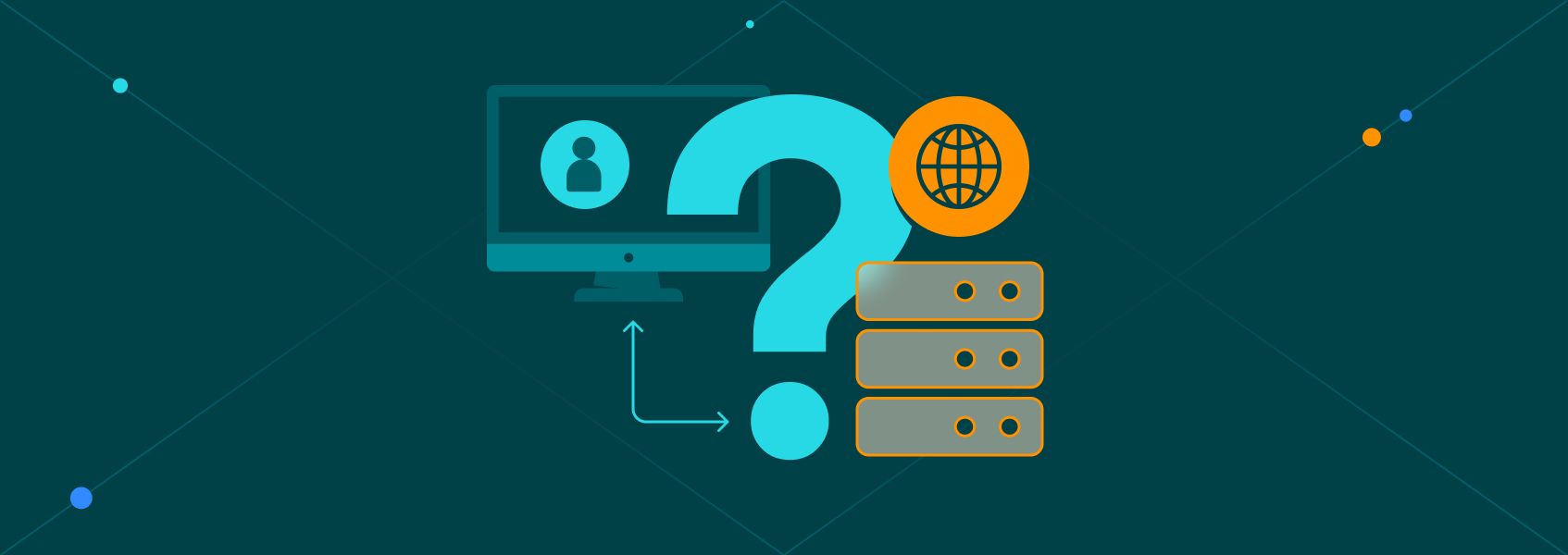What Is a Proxy Server and How Does It Work?
Proxy fundamentals

Simona Lamsodyte
Key Takeaways
-
A proxy is an intermediary device that sends requests on your behalf, hiding your original IP address and related information.
-
Proxies can be categorized by traffic direction: forward or reverse. Forward proxies, such as residential or datacenter proxies, are the most common.
-
Proxies can help improve privacy, security, bypass geo-restrictions, and enable tasks such as web scraping and SEO monitoring.
Each time you connect to the internet, your device sends a request to the target server, specifying what’s needed for online communication. Among these details is your IP address, a unique string of characters tied to your approximate location and Internet Service Provider (ISP).
An IP address is critical for tracking you online, filtering content by location, and restricting activities such as automation and web scraping. By routing your requests, proxy servers are one of the easiest ways to conceal your IP address and avoid such limitations.
What Is a Proxy Server?
A proxy server is an intermediary device that stands between you and the internet, using its own IP address to send requests on behalf of the user. Think of it as renting someone else’s device or IP address to keep your original IP and personally identifiable information hidden.
Besides increased privacy, proxies help individuals and businesses perform online tasks more efficiently. You can use proxies from different locations, allowing you to access the internet as if you were in those locations. Proxy servers also help you to send automated requests while avoiding rate limits, CAPTCHA, and other restrictions.
Proxies are often confused with VPNs , as both change your IP address. The main difference is that proxies do not encrypt your traffic by default, while VPNs do. It increases security when using public Wi-Fi, but it requires additional software, which might make your device slower.
Proxies are a more lightweight solution that can be integrated into software applications, from browsers to web scrapers. VPNs are a more one-size-fits-all solution common for everyday use.
Understanding the Inner Workings of a Proxy Server
Just like every house has a street address, every device connected to the internet has a unique IP address . It’s how devices on the internet know where to send data so you can access the content you need. While this is crucial for online communication, showing your IP makes you identifiable.
When connecting to the internet through a proxy server, the server acts as a middleman between you and the websites or online services you access. Instead of accessing those sites directly, your requests are sent to the proxy, which then forwards them to the sites on your behalf.
This indirect connection means that your IP address and associated data, such as your location and your ISP’s name, aren’t visible to the websites you visit. What the destination servers see is your proxy’s IP address and location. Some proxies are transparent and tell the server they are proxies, but most proxies are anonymous.
Proxy servers can provide access to a single user, making them private or dedicated proxies. These are the most reliable and secure proxies because they are not shared among multiple users simultaneously. As a result, you have complete control over each activity.
Types of Proxies Based on the Direction of Traffic Flow
We’ve already touched on some of the proxy types here and in other blog posts. The main distinction we’ll discuss here is the direction of traffic flow, which can be forward or reverse.
Forward Proxies
When you hear someone talk about a proxy, it’s most likely a forward proxy. It sits between a client and the internet. When a client requests a resource, the request is first sent to the forward proxy server. The proxy then retrieves the requested resource on behalf of the client and returns it.
In a nutshell, it functions as a middleman for your online traffic, handling your web requests and receiving the responses on your behalf. People use this proxy type for anonymous browsing, bypassing geo-restrictions, web scraping, and various other tasks. The two main types of forward proxies are residential and datacenter.
- Residential proxies
These proxies are obtained from real residential devices (mostly laptops or computers) used by household users. Their IP addresses are registered with residential ISPs, so your traffic appears to come from those IPs instead of yours. For that reason, they have the highest IP trust scores and are regarded as the most private proxies.
- Datacenter proxies
Datacenter proxies obtain their IP addresses from commercial data centers that run virtual machines. As such, they are not linked to real users and ISPs, and they have a lower IP legitimacy than residential proxies. On the plus side, they are a faster, cheaper option better suited for traffic-intensive tasks.
Reverse Proxies
Reverse proxies also provide privacy and anonymity for online tasks. But unlike forward proxies, they sit in front of the web server instead of the client, hiding the web server’s identity.
To put it simply, they do the opposite of what forward proxy servers do. By acting as a filter for incoming requests to a website, they help with caching, privacy, load balancing, security, and encryption.
So if you have a website, service, or app that gets a lot of traffic every day, reverse proxies can help you ensure everything runs smoothly and safely.
The Benefits of Using a Proxy Server
Whether you’re a business or personal internet user, masking your IP address with a proxy server will help you unlock unlimited internet access and make your experience more anonymous and secure. Let’s go through some of the most significant advantages of using reliable proxy servers .
Improving Your Privacy
Nowadays, every company is trying to track our online activity and get user data. This is why maintaining online privacy is only possible with tools like proxies. By hiding your IP address and location, proxies make it harder to track your online activity.
Surfing the net anonymously is particularly valuable for businesses, journalists, activists, and researchers. It’s the easiest way to increase your freedom of expression, get the information you need, and perform a wide range of online business tasks efficiently and safely.
Accessing Geo-restricted Content
Geo-blocking is the practice of limiting your access to digital content based on geographic location. Streaming services, such as HBO or Netflix, and almost any other major website practice geo-blocking to limit user access to content. It’s also common for governments to block or restrict access to social media, search engines, and other online content.
No matter who’s behind the geo-blocking, proxies can help. Geo-restrictions rely on users’ IP addresses, and proxies can change your IP to anywhere in the world. If you live in the US and use a German proxy, you can access German content as if you were in Germany.
Improving Your Online Security
Any individual or organization can become a victim of a cyberattack. From financial losses to reputation damage, the consequences can be severe. Reliable proxies are a part of the security strategy of many businesses, providing an additional layer of security for all devices on a corporate network.
They operate at the application layer of the OSI model, cutting the risk of data leaks. Moreover, they can be used as firewalls or web filters to protect against malware and other online threats. Proxies are a simple way to protect yourself and your company from data leaks and identity theft.
Web Scraping
Instead of manually gathering data from websites, you can use automation tools called web scrapers to speed up and simplify the process. Businesses use web scraping for market research, price aggregation, lead generation, competitor analysis, and many other use cases.
Web scraping can be a sensitive topic, as website owners want to avoid their servers being overloaded by automated requests. For that reason, they may limit the number of requests from one IP address.
With proxies, you can avoid IP-based restrictions and help your web scraper send requests from various locations. The requests appear to be coming from different visitors in different locations. As a result, it becomes impossible for the target web servers to detect and block your scraper.
SEO Monitoring and Research
Search Engine Optimization (SEO) helps businesses rank higher in search engines, which, in turn, helps them to get organic traffic , more customers, and higher revenue. SEO practices involve regularly checking search engine result pages and monitoring the competition.
Proxies make this process easier by allowing companies to replicate searches across numerous IPs from various locations. As a result, they gain valuable SEO performance insights, enabling them to adjust their SEO strategy and improve their search engine rankings.
Providing Faster Speed and Saving Bandwidth
Every online user wants a fast internet connection, especially when downloading large files from remote server locations. Whether for gaming or scraping data, proxies can improve content delivery speed and reduce the bandwidth usage.
A proxy server can be located closer to the target server, or it can bypass blocks that limit performance. Reverse caching proxies can also make content instantly available to all users on the network. Aside from saving bandwidth, proxies reduce operational costs by improving page loading speed.
Blocking Access to Unwanted Websites
If you’re a business owner and want to prevent employees from accessing distracting websites during office hours, proxies can help. They let you block entire websites, specific URLs, or apps like Facebook, TikTok, and YouTube, so no one wastes time at work.
This feature can also help you keep users away from illegal or unsafe websites, protecting your corporate data. Likewise, proxies can help network administrators monitor traffic and introduce new rules as necessary.
The list of benefits of using a proxy server doesn’t end here, especially for business users. They often use proxies to manage multiple social media accounts, improve email security, balance traffic to prevent network crashes, perform web testing, verify ads, etc.
How to Buy a Proxy: Step-by-Step
1. Choose a proxy provider
Research multiple proxy providers to ensure they offer the needed proxy types, countries, authentication methods, protocols, and other features. Chat with customer support, read documentation, and find reviews on platforms like Trustpilot for extra measure.
IPRoyal offers a variety of premium-quality proxies across 195 countries with 99.9% uptime at unbeatable prices. Thousands of happy customers are scaling their projects with our proxies every day and have left outstanding reviews online.
2. Create an account
After you’ve found a fitting proxy provider, create an account . With IPRoyal, you can sign up in minutes using Google, LinkedIn, or by entering an email address and creating a password.
3. Select subscription details
After you log in to the dashboard, select the needed proxy type. Depending on it, you’ll have the option to choose either the traffic volume or the subscription length. Additional order details, such as proxy country, IP quality, or special requirements, can also be included at this step.
4. Complete the purchase
After choosing a subscription plan (or a pay-as-you-go option for our residential proxies), select a payment method. Credit card, Crypto, PayPal, Google Pay, and Alipay are available.
5. Find your proxy credentials
Once the payment is completed, find your proxy credentials (IP address, port number, and username/password) in the dashboard. You can also set up IP whitelisting for easier access.
6. Configure and test your proxy
Lastly, use the credentials to set up a proxy on your device and test it. The easiest way is to use IPRoyal’s proxy manager extension on your browser and visit an IP Lookup tool to see if your location has changed. Alternatively, you can use a proxy client .
The Potential Dangers of Using a Proxy Server
Like anything else operating over the internet, proxies can also pose certain cyber threats, but they mainly apply to free and shared proxies. Shared proxies obtained from unreliable providers are not the best choice for anyone who cares about online security, privacy, and speed.
Some of the dangers associated with proxies include a lack of encryption. Unlike VPNs , proxies may not support encryption, making your connection unsafe. They may also run on open ports, which helps cybercriminals gain access to sensitive data.
Another reason why you may want to avoid free proxies is the inconsistent speed and frequent crashes. If you rely on proxy servers to keep you protected, you should be able to rely on them at all times. Therefore, it’s critical that you use premium private proxies from a reliable provider. Only that way can you take full advantage of everything they have to offer.
FAQ
What is a proxy server definition?
A proxy server is an intermediary between your device and the website or online platform you want to access. It keeps your online identity private by using its own IP address to connect you to the destination server.
What is a proxy server used for?
As long as the proxy is reliable, you can use it for many private and business-related online activities. They include anonymous browsing, efficient web scraping, SEO monitoring and research, bypassing geo-restrictions, protecting sensitive data, online gaming, etc.
What’s the difference between a VPN and a proxy?
While both can protect your online identity and enhance your privacy, they work in different ways. Proxies are faster and have a more diverse set of features. VPNs, on the other hand, encrypt your traffic by default, which is a plus. However, they’re not suitable for specific tasks that proxies can handle.
Why should you NEVER use free proxies?
Free proxies are unreliable, so they may stop working when you need them the most. They usually offer slow speeds and may already be blacklisted by many websites due to their questionable history. Also, cybercriminals can set them up as a front to steal your sensitive data.
Is it legal to use proxies?
Using proxies isn’t illegal as long as you don’t use them for any illegal activities. The legality of using proxies depends on the country in which you plan to use them. Some countries may prohibit the use of proxies for certain tasks, so make sure to stay up to date on local laws and regulations.

